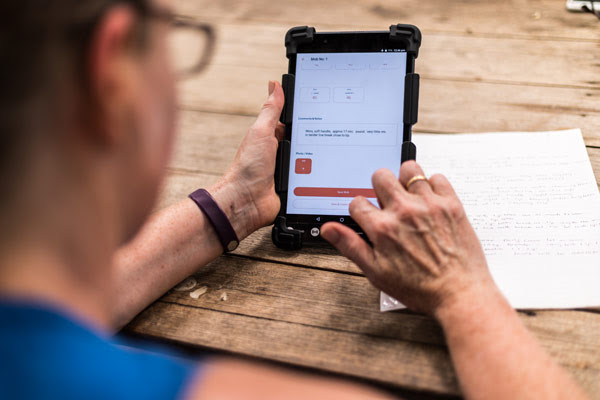
A proposed growers’ motion would shut WoolQ down.
AUSTRALIAN wool growers will be petitioned to support the abandonment of the industry’s WoolQ online services and trading platform.
Australian Wool Innovation describes WoolQ as a secure online platform where wool growers, classers, brokers and buyers can access digital tools to support all stages of the wool-growing and selling cycle.
It was developed as the major recommendation of AWI’s Wool Selling Systems Review final report in 2016.
New South Wales wool grower and AWI shareholder Robert Ingram said it has been estimated that AWI has spent $5.5-$7 million on WoolQ with only low volumes of wool sold and limited adoption by growers, brokers and exporters.
The proposed motion says: “AWI cease immediately all investment in WoolQ and block chain technology. WoolQ to be sold or wound up within nine months.”

AWGA director Robert Ingram
Mr Ingram is circulating the motion on behalf of the Australian Wool Growers Association for submission by 20 October as an ordinary resolution for voting at AWI’s 2020 annual general meeting on 20 November. The motion needs the signatures of 100 shareholders to be accepted.
He believes the WoolQ investment has breached AWI’s Statutory Funding Agreement with the Federal Government because it did not address a market failure. AWI’s involvement with WoolQ in selling wool also contravened the SFA and AWI’s Constitution, he said.
Under the SFA, levy funds may only be applied to research and development activities, marketing activities and other activities related to the industry, for the benefit of shareholders and levy payers. ‘Marketing activities’ are defined as the marketing, advertising and promotion of products of the industry and ‘other activities’ means AWI activities supported by levy payers and shareholders and that relate to a function for which there is market failure.
AWI has consistently argued that WoolQ addressed a lack of electronic or digital development in wool trading, but Mr Ingram said there are already two privately owned electronic wool-selling platforms – AuctionsPlus online auctions and its wool offer board. He said the trading of wool is outside AWI’s mandate under the SFA.
“The SFA states that AWI is to undertake research and development, but not to market wool.
“It’s the interpretation of the word ‘marketing’ that is critical,” he said.
“Under the SFA, ‘marketing’ refers to marketing or promotion of the product, not the selling of the product.
“The SFA does not allow AWI to sell wool.”
He said this market failure “contravention” has also been raised with the Department of Agriculture, Water and the Environment.
Mr Ingram said AWI had also proceeded with WoolQ despite a WoolQ Review Committee recommending that the system only be implemented in collaboration with the Australian Wool Exchange and the Australian Wool Testing Authority.
He said the motion was not an attempt to stymie the adoption of innovation and technology in the wool industry.
“It is all about ensuring that good governance and due process are correctly followed in accordance with the SFA and the Constitution.”
WoolQ is also a digital data store
AWI told a Senate estimates hearing earlier this year that WoolQ offers more than selling options to wool growers and is a tool for digital collection and storage of all wool grower data.
“The data once collected will then provide the basis for a suite of analytical tools that will assist the wool growers to make more nuanced decisions regarding the selling of their wool, to more timely information the wool and the ability to profile their business.
“Finally, WoolQ will provide the technology to allow traceability and provenance stories to be delivered to customers in an efficient and cost-effective format,” AWI said.
In its response to questions from Senator Bridget McKenzie of the Rural and Regional Affairs and Transport Committee in March, AWI defended spending $4.3 million on WoolQ by claiming there has been little transformation or modernisation of the wool selling system for more than a century.
“It is expected that addressing this market failure would release unrealised benefits and returns to wool growers through increased competition and returns.
“AWI believed there was significant opportunities to innovate the selling system in line with 21st century technologies and marketing arrangements for the benefit of growers,” AWI told the Senate committee.
“The (WSSR) review panel concluded that a Wool Exchange Portal (WEP), which became WoolQ, would allow the industry to most efficiently deal with the impediments to development in a holistic manner.”
Online platforms provide confidence in business continuity
An AWI spokesman told Sheep Central today that at a time when the social distancing regulations could have had a devastating impact on the traditional open cry wool auctions around Australia, WoolQ and other online selling platforms provided the industry with an appropriate level of confidence in business continuity, planning and contingency.
“When seemingly every industry is gravitating ever further into the digital online space WoolQ is perfectly positioned to ensure the Australian wool industry is future proofed and not left behind.
“Consumer priorities have undergone a massive shift in recent years towards understanding the origin of their products and the journey it has travelled,” he said.
“WoolQ is a purpose built platform for wool growers and all supply chain participants to showcase themselves to the global audience and remain relevant in a highly competitive textile fibre market.”
The spokesman said WoolQ Market has held 10 live on-line auctions since April this year and has sold wool on behalf of large and small and brokers.
“That wool has been purchased by registered Australian wool buyers representing some 85 percent of the buying fraternity.”
He said there has been 1397 bales offered for sale, with 566 bales sold. WoolQ registrations total 3212, with 1091 E-Specis completed and 34,824 bales created.
“The feedback from all market participants has been overwhelmingly positive with users finding the platform to be an efficient and flexible alternative to open cry trading.
“We have confidence in the platform’s functionality and that it can handle a significant increase in trading volumes,” he said.
“It is also important to understand that the transacting of wool is only one facet of the platforms functionality.
“There are a suite of grower tools and connectivity capabilities being used that continue to evolve with growing industry involvement,” the spokesman said.
“We are in the process of launching additional market functionality including an online bulletin (offer) board available on a 24/7 basis as well as a progressive tender facility requested by industry intermediaries.
“WoolQ has attracted much attention from both corporations and wool growing designations around the world who recognise the potential. It is an important long term investment for Australian wool growers,” he said.
The spokesman said AWI shareholders have rights to put resolutions to any general meeting and they will be dealt with in accordance with the Corporations Act.
The spokesman did not disclose what has been spent on WoolQ to date nor whether AWI had considered any cutbacks to the platform or its sale. AWI chief executive officer Stuart McCullough has previously declared “every single” area of the organisation’s spending is under review and the WSSR Report stated that a search for a new owner of the Wool Exchange Portal (now WoolQ) could be initiated when it is “ready for market.”
Industry ‘buy-in’ on WoolQ didn’t happen – WPA
WoolProducers Australia chief executive officer Jo Hall said WoolProducers was initially supportive of further investigation of the Wool Exchange Portal/WoolQ when the concept was first proposed.
“However, our support was always conditional on the provision of additional detail around WoolQ and commitment from other supply-chain partners that they would utilise such a system if it was established, to ensure that grower levies were being used in an effective manner.
“This ‘buy-in’ from industry stakeholders clearly wasn’t achieved, which is extremely disappointing given the significant costs that wool growers have had to shoulder in the continued roll-out of WoolQ.”
Click here to read the petition and the explanatory notes and here to see it on the AWGA website tonight.

In these straitened times, it is not sensible to pour more money into what already seems to have been an investment failure, whether ultra vires (beyond one’s power/authority) or otherwise.
Hopefully WoolProducers, and indeed all wool growers, will get behind Robert Ingram’s initiative. WoolQ, the AWI wool selling portal, should never have been allowed to proceed and both our federal wool industry bodies are negligent in allowing it to do so.
Robert Ingram is quite correct. The WoolQ investment by AWI has breached AWI’s Statutory Funding Agreement with the Federal Government as it did not address a market failure. As Graeme Samuel, a member of the Wool Selling System Review (WSSR) panel said when the panel first reported,”there was no evidence of market failure.” Coming from the mouth of Australia’s competition guru, that should have been the end of the matter. But no, AWI in their arrogant way proceeded to embark on a white elephant that has cost wool growers dearly.
Today there are plenty of alternatives in the market place for selling wool, without the intrusion of AWI, who should “stick to their knitting”, if they know what that is.
Mr Robert Ingram, the sooner WoolQ is wound up the better. Leave it to the private sector. How do we stop this continual bleeding of money into areas that are already covered or where research has already been done? Mr Ingram, where do I sign up to support the motion?